1880 - 1885
William Ewart Gladstone, Liberal.
William Ewart Gladstone, Liberal.
Burial Laws Amendment Act gives individuals the right to be buried without any religious service or with a non-Anglican Christian service.
Education becomes compulsory for children under 10 years of age.
Married Women’s Property Act allows married women to own and control property in their own right.
Third Reform Act, or the Representation of the People Act, extends the vote to rural workers. All men paying an annual rental of £10 and all those holding land valued at £10 now have the vote.
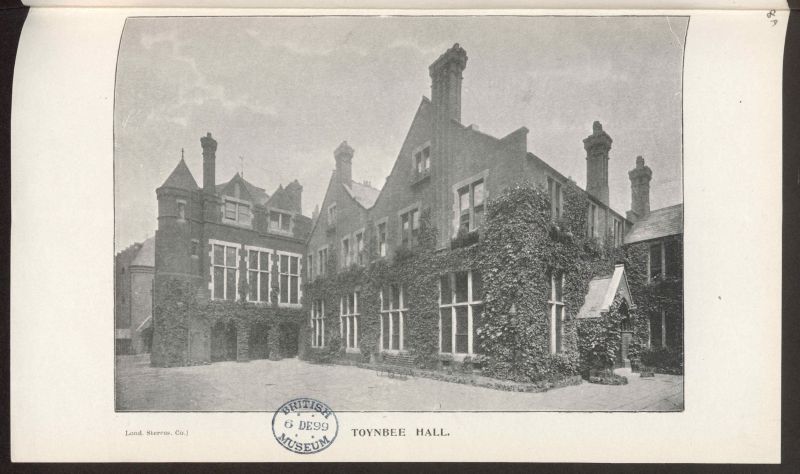
Toynbee Hall is created by Samuel Barnett, starting England’s settlement movement.
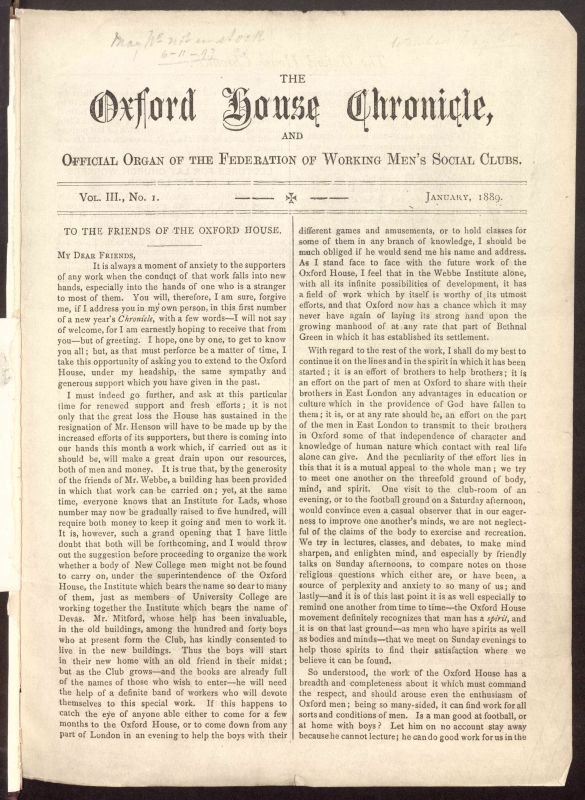
Oxford House in Bethnal Green is established.
Robert Gascoyne-Cecil, 3rd Marquess of Salisbury, Conservative.
Parliamentary Reform Act redraws constituency boundaries, increasing the number of MPs representing urban and working-class voters in the House of Commons.
Medical Relief Disqualification Removal Act is passed, ensuring those in receipt of poor relief would no longer loose their right to vote.
Criminal Law Amendment Act raises the age of consent and delineates the penalties for sexual offences against women and minors. It also strengthens existing legislation against prostitution and recriminalises homosexuality.
William Ewart Gladstone, Liberal.
Robert Gascoyne-Cecil, 3rd Marquess of Salisbury, Conservative.
Robert Louis Stevenson publishes The Strange Case of Dr Jekyll and Mr Hyde.
Contagious Diseases Act is repealed.
Women’s University Settlement is founded by women from Girton and Newnham Colleges (Cambridge), Lady Margaret and Somerville Colleges (Oxford) and Bedford and Royal Holloway Universities. It is intended to provide opportunities and schemes for advancement to the women and children of poorer London districts in order to promote their welfare.
Arthur Conan Doyle publishes A Study in Scarlet, which marks the first appearance of the fictional detective Sherlock Holmes and Dr Watson.
The Jack the Ripper murders take place in the Whitechapel area, London.
Scottish Labour Party is formed by Robert Bontine Cunninghame Graham, the first socialist MP.
Local Government Act establishes county councils and country borough councils in England and Wales. A similar Act is passed for Scotland the following year.
London dock strike breaks out in the Port of London and the subsequent victory of the dock workers helps establish strong trade unions amongst London dockers.
National Union of Gas Workers and General Labourers and Miners Federation of Great Britain is formed.
Prevention of Cruelty to, and Protection of, Children Act 1889, commonly known as the Children's Charter, is the first Act to impose criminal penalties to deter mistreatment of children. It also includes guidelines for employing children and outlaws begging.
NSPCC is founded following the Children’s Charter, consolidating many regional branches.
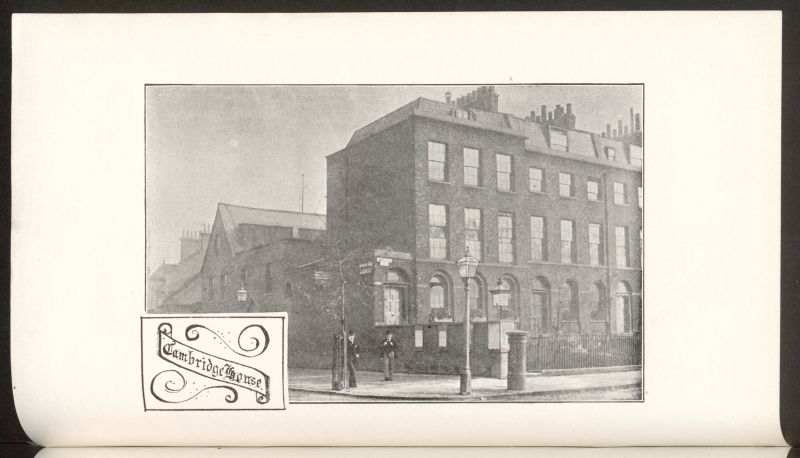
Trinity Court, later known as Cambridge House from 1896, is founded in Southwark. It offers a free legal advice service from 1898.
Lunacy Act places an obligation on local authorities to maintain institutions for the mentally ill.
Oscar Wilde publishes The Picture of Dorian Gray. It is criticised for obscenity by early reviewers and Wilde’s writings would be used later as evidence in his trials for gross indecency in 1895.
Housing of the Working Classes Act allows local authorities to regulate standards of slums and council houses. It marks the beginning of social housing provision through giving London County Council the power to purchase land and construct housing.
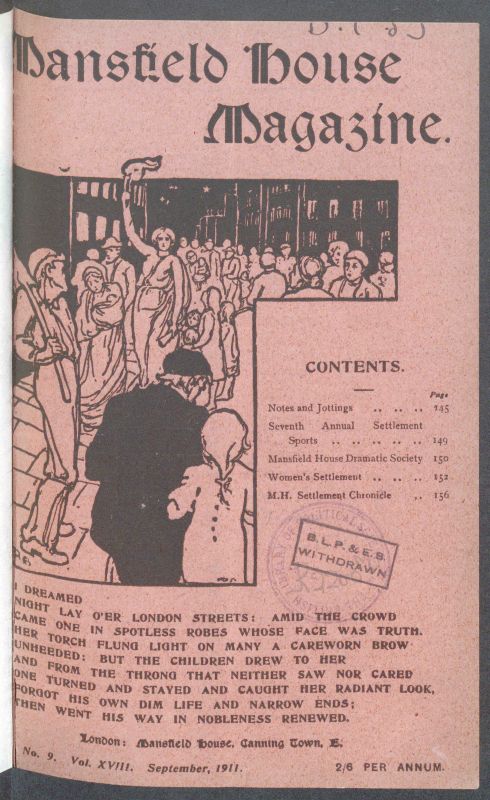
Mansfield House is established. One of several Nonconformist university settlements which were established on the model of Toynbee Hall, the Mansfield Settlement was named after the Mansfield College (Oxford) students who drove its foundation. The students had already been spending parts of their university vacations in Canning Town, which was becoming increasingly congested through massive population growth.
Thomas Hardy publishes Tess of the d’Urbervilles: A Pure Woman Faithfully Presented.
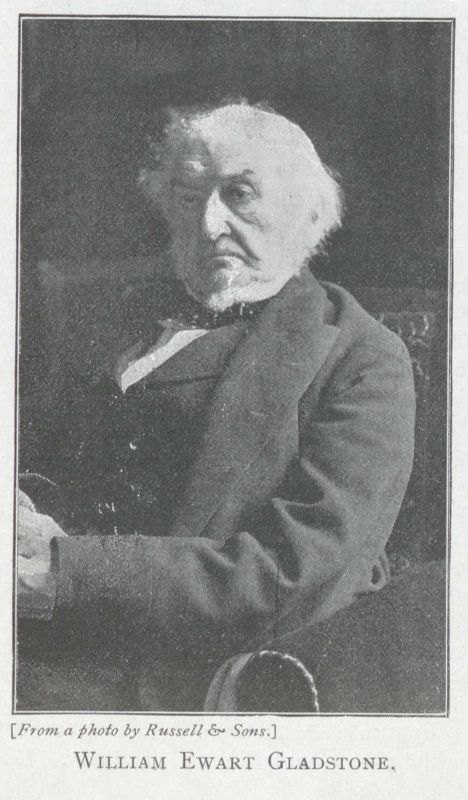
William Ewart Gladstone, Liberal.
Durham Miners’ Strike against a proposed cut to wages. A prolonged strike, it ends when negotiations settle on a 10% cut.
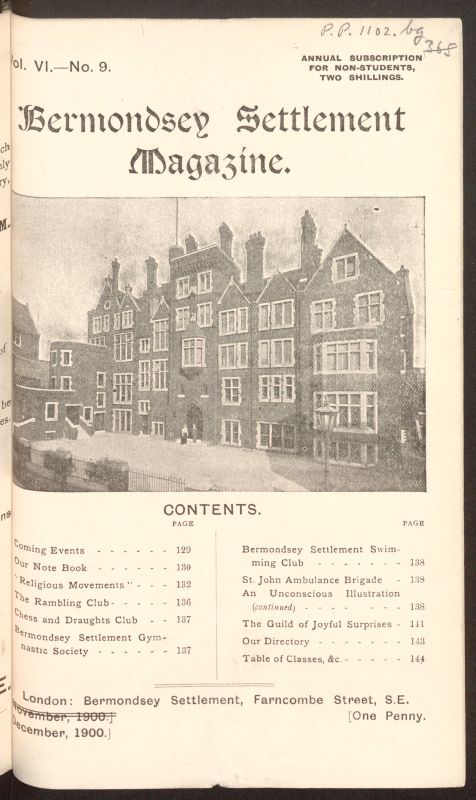
Bermondsey Settlement is established by the Rev. John Scott Lidgett. Designed by Elijah Hoole, the architect of Toynbee Hall, Bermondsey settlement was supported by the University of Cambridge and the Wesleyan University Society and aimed to span the gap between rich and poor through evangelism and social action.
Independent Labour Party is established by trade unionist and politician Keir Hardie. The party was affiliated with the Labour Party between 1906 and 1932.
Archibald Primrose, 5th Earl of Rosebery, Liberal.
Charles Booth publishes The Aged Poor in England and Wales, which identifies pauperism as a major social problem among the elderly. The work aimed to better understand the demographics of the people who received Poor Law assistance.
Local Government Act reforms local government in England and Wales. Introducing elected councils at both district and parish level, the Act reforms Boards of Guardians and entitles women who own property to vote in local elections.
Local Government Board for Scotland is established, responsible for the administration of both poor law and public health functions.
Robert Gascoyne-Cecil, 3rd Marquess of Salisbury.
Manchester University Settlement is established as the first UK University settlement outside of London. Situated in the Ancoats area of Manchester, it provided a residence for academics who would organise lectures, concerts and other activities for local people.
A Child of the Jago by Arthur Morrison is published. It fictionalises the Old Nichol, a slum in East London and follows the life of a child growing up there.
Lady Margaret Hall Settlement is established in North Lambeth by members of Lady Margaret Hall, Oxford, in order to facilitate their work developing opportunities for the poor.
Local Government Board (Ireland) Act of 1898 establishes county councils and district councils in Ireland.
Labour Representation Committee is founded. The LRC is a pressure group formed of socialist organisations and trade unions which aimed to promote the interests of labour in Parliament.
Housing of the Working Classes Act is extended beyond London.
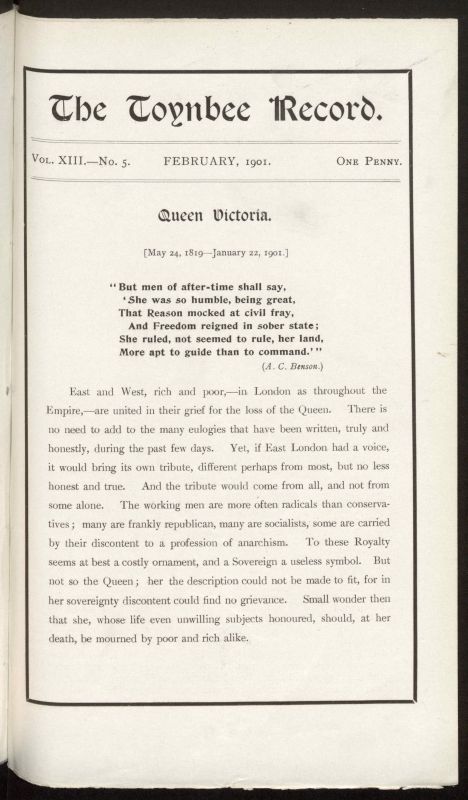
Queen Victoria dies and Edward VII becomes King.
British Psychological Society is founded at University College London. Its aim is to advance research and increase cooperation between those studying the different branches of psychology.
Arthur James Balfour, Conservative.
Education Act (also known as the Balfour Act). Representing a radical reorganisation of the education system, the act abolishes school boards in England and Wales and replaces them with Local Education Authorities.
Sir Henry Campbell-Bannerman, Liberal.
Thomas Edmund Harvey takes over as Toynbee Hall Warden.
Liverpool University Settlement is established.
Education (Provision of Meals) Act gives local education authorities in England and Wales the power to cooperate with local charities to provide school meals, and also empowers them to provide free meals to children deemed to be unable, by reason of lack of food, to profit from the education provided to them.
Education (Administrative Provisions) Act. The act requires local authorities to establish medical inspection units where school children would be examined at least three times over the course of their schooling. Certain schools are required to provide free places and the act states that from 1912 medical treatment in schools would be free.
Herbert Henry Asquith, Liberal.
Education (Scotland) Act introduces school meals and school medical inspection to elementary schools in Scotland.
Old Age Pensions Act provides the first UK state pensions, which are means-tested and funded through taxation.
Bristol University Settlement (now Barton Hill Settlement) is established. Its first warden is Hilda Cashmore, who was especially interested in reducing infant mortality rates and the Settlement ran an “Open Air School” to aid children who suffered often with chest infections like tuberculosis.
National Insurance Act is passed, representing the foundation of the welfare state. It is intended to create a system of insurance for workers against illness and unemployment. Wage-earners, employers and the state contributed and in return workers received a level of free medical care and “dole” in the case of unemployment.
First World War.
David Lloyd George, Liberal.
Increase of Rent and Mortgage Interest (War Restrictions) Act introduces first rent controls, reducing the incentive for private landlords to rent housing and forcing the state to consider alternative strategies for addressing the shortfall. Similar measures were introduced in 1919, 1923, 1933 and 1938.
Ministry of Health Act means that the new Ministry of Health takes over the functions of the Local Government Board in England and Wales, including the administration of the Poor Law, and National Health Insurance administration.
Housing, Town Planning, &c. Act requires all local authorities to survey the housing needs of their areas and draw up plans for the construction of new housing. It also empowers the Treasury to use central government funds to support local housing initiatives. The Act is also known as the “Addison Act” after Dr Christopher Addison, the Minister of Health, and it was significant for making housing a national responsibility. In the same year, the Housing (Additional Powers) Act is passed to enable the government to offer subsidies to private builders. Later acts enable more subsidised housing and replacement housing for those who would have been rendered homeless under slum clearance schemes.
Local Government Board for Scotland is abolished and replaced by the Scottish Board of Health.
Irish War of Independence.
Part II of the National Insurance Act providing unemployment insurance for a limited number of workers undergoes extensions and changes. First, the number of workers covered by the scheme increases from around 4,000,000 to more than 12,000,000; the length of time for which unemployment insurance benefits can be paid is increased; and the level of benefit is increased to account for not only inflation, but also the needs of dependents.
Signing of the Anglo-Irish Treaty and creation of the Irish Free State. This marks the end of the Local Government Board for Ireland.
Andrew Bonar Law, Conservative.
Stanley Baldwin, Conservative.
James Ramsay MacDonald, Labour.
Stanley Baldwin, Conservative.
Widows', Orphans' and Old Age Contributory Pensions Act is introduced alongside the Old Age Pensions Act 1908.
General Strike. A nine day strike of some 1.7 million workers across the nation is called by the General Council of Trades Union Congress in response to an unsuccessful attempt to force the government to stop wage reduction and deteriorating conditions for 1.2 million locked-out coal miners.
James Ramsay MacDonald, Labour.
Local Government Board (Scotland) Act passed.
Workhouse system is abolished in the UK by the Local Government Act of 1929. Many workhouses were renamed Public Assistance Institutions, however, and continued to operate.
Unemployment Act establishes the Unemployment Assistance Board, in response to high levels of interwar poverty. The Board paid means-tested assistance.
Stanley Baldwin, Conservative.
Neville Chamberlain, Conservative.
Second World War.
Sir Winston Churchill, Conservative.
Beveridge Report on Social Insurance and Allied Services is published.
Family Allowances Act is passed and becomes the first law to provide child benefit in the United Kingdom.
Clement Attlee, Labour.
National Insurance Act establishes the structure of the welfare state.
National Health Service Act provides for the establishment of a comprehensive health service for England and Wales. Legislation for Scotland and Northern Ireland follows in 1947 and 1948 respectively.
National Assistance Act abolishes the last vestiges of the Poor Laws and, therefore, the remainder of workhouses in the UK.